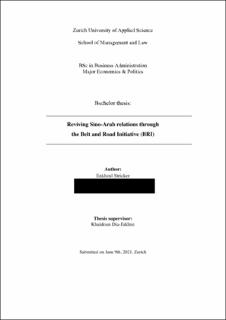Bitte benutzen Sie diese Kennung, um auf die Ressource zu verweisen:
https://doi.org/10.21256/zhaw-24359| Publikationstyp: | Thesis: Bachelor |
| Titel: | Reviving Sino-Arab relations through the Belt and Road Initiative (BRI) |
| Autor/-in: | Stricker, Enkhzul |
| Betreuer/-in / Gutachter/-in: | Dia-Eddine, Khaldoun |
| DOI: | 10.21256/zhaw-24359 |
| Umfang: | 130 |
| Erscheinungsdatum: | 2021 |
| Verlag / Hrsg. Institution: | ZHAW Zürcher Hochschule für Angewandte Wissenschaften |
| Verlag / Hrsg. Institution: | Winterthur |
| Sprache: | Englisch |
| Fachgebiet (DDC): | 330: Wirtschaft 900: Geschichte |
| Zusammenfassung: | China's involvement in the Middle East steadily increased after it instituted economic reforms in the late 1970s. Now, China has a strong presence in the region; this has been further strengthened by the establishment of the Belt and Road Initiative (BRI), the flagship foreign policy initiative of Xi Jinping, the president of the People's Republic of China (PRC). The objective of the current thesis is to analyze how China appeals to other countries through soft power in the context of the BRI. To this end, the thesis examines the BRI through debates on soft power in International Relations (IR). It takes Egypt and Saudi Arabia as a case study to assess the extent of soft power instruments used in these states. A literature review and expert interviews were conducted to address the aforementioned objective. The literature review elucidates the major IR theory of realism and the concept of soft power and its applicability to China's BRI. The expert interviews support a holistic interpretation of the findings by confirming or complementing them in the analysis section and providing further insight on challenges associated with the BRI and China's future relationships with Egypt and Saudi Arabia. The results of the analysis show that soft power plays a vital role in the BRI, but it is rather limited in Egypt and Saudi Arabia. As states like Egypt and Saudi Arabia strive to improve social welfare, their eagerness allows China to use the BRI to further this ambition. As commonly voiced, the aim of the BRI is to seek common ground while setting aside differences for prosperity to attract other nations to take part of the BRI and to make China as an attractive partner. In the context of the BRI, China deploys soft power in the political, economic, and cultural spheres. Based on the five cooperation objectives of the BRI, it can be established that the philosophy surrounding the policy of noninterference and neutrality is attractive to Egypt and Saudi Arabia in the political sphere. Moreover, economic soft power tools are also apparent in the BRI. According to the analysis, building partnerships on a win-win basis and leveraging participants to foster development are effective instruments of China's soft power. Moreover, the BRI promotes people-to-people exchange, which falls within the domain of culture and can be seen as a catalyst for soft power. Although China is starting from a low base, people in the Middle East are becoming more culturally aware of the country through BRI funded projects developed under the priority of people-to-people bonds (e.g., Confucius Institutes and other educational exchange programs). The paradigm that China seeks to create is apolitical, development-focused, and favorably distinguishable from that of rival powers. China's conduct on the international stage, which emphasizes multilateralism, neutrality, and noninterference, is intended to bolster this paradigm and portray China as not only benign but also a responsible global leader in the Middle East. This study contributes to the existing literature on China's soft power strategy and provides a basis for understanding China's charm strategy towards the Middle East through the BRI. Furthermore, this work lays the foundation for future research on China's application and interpretation of soft power through the BRI. There is a clear need for further research on new developments in upcoming years to assess whether China's promises will bear fruit for the countries involved and whether China's influence in the Middle Eastern region will increase or decrease. |
| URI: | https://digitalcollection.zhaw.ch/handle/11475/24359 |
| Lizenz (gemäss Verlagsvertrag): | CC BY-NC-ND 4.0: Namensnennung - Nicht kommerziell - Keine Bearbeitungen 4.0 International |
| Departement: | School of Management and Law |
| Enthalten in den Sammlungen: | BSc Betriebsökonomie |
Dateien zu dieser Ressource:
| Datei | Beschreibung | Größe | Format | |
|---|---|---|---|---|
| Bachelor's_Thesis_Stricker_Enkhzul.pdf | 2.11 MB | Adobe PDF |  Öffnen/Anzeigen |
Zur Langanzeige
Stricker, E. (2021). Reviving Sino-Arab relations through the Belt and Road Initiative (BRI) [Bachelor’s thesis, ZHAW Zürcher Hochschule für Angewandte Wissenschaften]. https://doi.org/10.21256/zhaw-24359
Stricker, E. (2021) Reviving Sino-Arab relations through the Belt and Road Initiative (BRI). Bachelor’s thesis. ZHAW Zürcher Hochschule für Angewandte Wissenschaften. Available at: https://doi.org/10.21256/zhaw-24359.
E. Stricker, “Reviving Sino-Arab relations through the Belt and Road Initiative (BRI),” Bachelor’s thesis, ZHAW Zürcher Hochschule für Angewandte Wissenschaften, Winterthur, 2021. doi: 10.21256/zhaw-24359.
STRICKER, Enkhzul, 2021. Reviving Sino-Arab relations through the Belt and Road Initiative (BRI). Bachelor’s thesis. Winterthur: ZHAW Zürcher Hochschule für Angewandte Wissenschaften
Stricker, Enkhzul. 2021. “Reviving Sino-Arab Relations through the Belt and Road Initiative (BRI).” Bachelor’s thesis, Winterthur: ZHAW Zürcher Hochschule für Angewandte Wissenschaften. https://doi.org/10.21256/zhaw-24359.
Stricker, Enkhzul. Reviving Sino-Arab Relations through the Belt and Road Initiative (BRI). ZHAW Zürcher Hochschule für Angewandte Wissenschaften, 2021, https://doi.org/10.21256/zhaw-24359.
Alle Ressourcen in diesem Repository sind urheberrechtlich geschützt, soweit nicht anderweitig angezeigt.